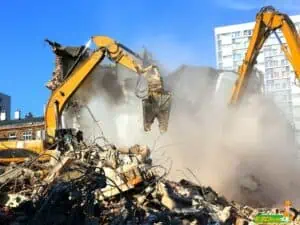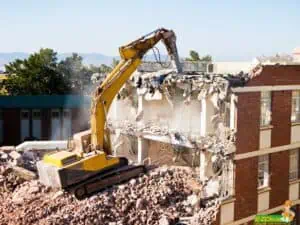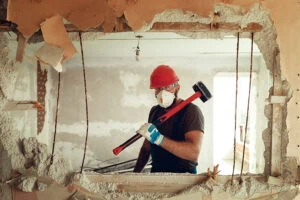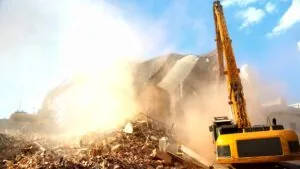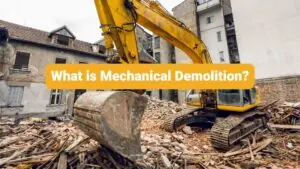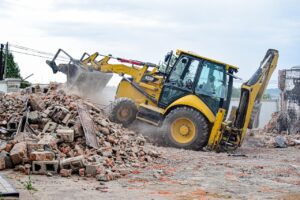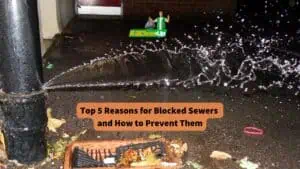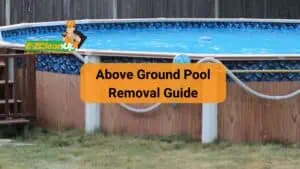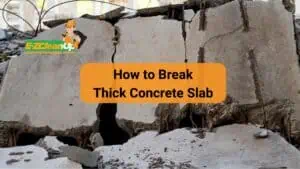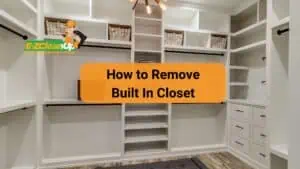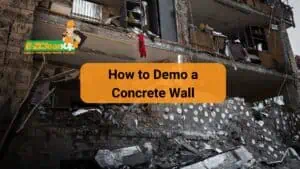To ensure a successful mobile home demolition, select between deconstruction for material reuse and environmental benefits or traditional demolition for speed. Preparation includes obtaining permits, ensuring safety, and planning debris disposal.
Read the rest of this guide to learn more about how to demo a mobile home.
Mobile Home Demolition Methods
Choosing the right method for mobile home demolition is important for a successful, safe, and environmentally friendly project. Whether opting for deconstruction or demolition, understanding the advantages and procedures of each method ensures an efficient process.
Deconstruction vs. Demolition: Pros and Cons
The choice between deconstruction and demolition depends on several factors, including the project’s goals, budget, and timeline:
Deconstruction
This method involves carefully dismantling the mobile home piece by piece to salvage materials for reuse or sale. While deconstruction can be more time-consuming compared to traditional demolition, it offers significant environmental benefits by reducing waste sent to landfills.
Salvaging materials can also offset some of the demolition costs and support community sustainability by providing affordable building materials. The main advantage of deconstruction lies in its potential to minimize environmental impact and promote recycling efforts.
Traditional Demolition
This method is quicker, using heavy-duty equipment to tear down the structure. Although it’s a faster process, traditional demolition may generate more waste and provide fewer opportunities to salvage materials.
The primary benefit of traditional demolition is its efficiency. This makes it particularly suitable for projects with tight timelines or when the structure is not a candidate for material salvage. However, it might not be the best choice for those who prioritize environmental sustainability and cost recovery through material reuse.
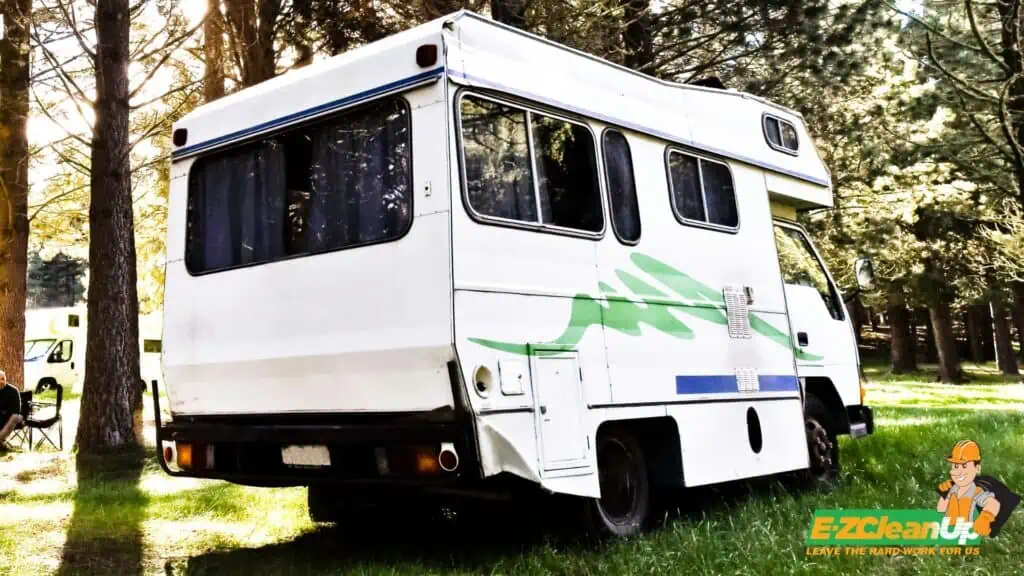
Preparing for Mobile Home Demolition
A mobile home demolition requires careful preparation to ensure the process is smooth, safe, and in compliance with local regulations.
Understanding and Obtaining Necessary Permits
Each locality has its own set of rules and fees associated with obtaining the necessary permits for mobile home demolition. These permits are essential to ensure that your project complies with local zoning laws and environmental regulations.
Often, the process involves submitting detailed plans of the demolition project to local authorities and may include a fee ranging from $100 to $350, depending on your location. If you find this process difficult or time-consuming, you can seek advice and assistance from professionals with experience in dealing with these regulations.
Securing the Site and Ensuring Safety
Safety when it comes to mobile home demolition includes following established standards, such as wearing the appropriate protective gear and ensuring the mobile home is structurally stable before beginning the process.
It is also important to be aware of and comply with local codes and regulations regarding safety measures, environmental considerations, disposal methods, and noise restrictions. These regulations are in place to protect not only those working on the demolition but also the surrounding community and environment.
Conducting a thorough assessment of the mobile home’s condition prior to demolition is important to ensure a safe and compliant demolition process.
Step-by-Step Guide to Safe Demolition Practices
To ensure a safe and efficient demolition process, especially for a mobile home, it’s crucial to follow a series of well-planned steps. Each step is designed to minimize risks and streamline the demolition process:
- Shutting Off All Utilities: The first step involves disconnecting all utilities connected to the mobile home. This includes water, electricity, gas, and sewer services. It is crucial to ensure that these services are completely shut off to avoid accidents such as gas leaks or electrical fires during demolition. Contacting your utility providers ahead of time to schedule these disconnections is recommended.
- Clearing the Home of Personal Items: Before starting the demolition, remove all personal belongings, furniture, appliances, and any other items from the home. Additionally, identify materials that can be salvaged for reuse or sale, such as doors, windows, and fixtures.
- Systematic Approach to Demolition: Begin the demolition from the top of the mobile home and work your way down. Dividing the home into manageable sections can make the process more efficient and safer. This systematic approach helps maintain structural stability for as long as possible during the demolition. It also reduces the risk of unexpected collapses.
- Employing the Right Tools: Reciprocating saws, sledgehammers, and pry bars are common tools used to dismantle structures efficiently. Ensure that all tools are in good working condition and that operators are familiar with their safe use to prevent injuries.
- Proper Planning and Safety Protocols: Before beginning the demolition, it’s essential to have a clear plan in place. This includes understanding the structure’s layout, identifying potential hazards, and determining the most effective demolition method. Adherence to safety protocols is crucial. This means wearing protective gear, such as hard hats, safety goggles, gloves, and steel-toed boots.
Sorting Debris for Disposal or Recycling
The final phase of demolition, which is both crucial and impactful, involves the meticulous process of sorting debris for disposal or recycling. By identifying materials that can be recycled or repurposed—such as metals, wood, and certain fixtures—stakeholders can significantly contribute to the reduction of waste and support the circular economy.
At EZ CleanUp, we offer dumpster rental services designed to accommodate the disposal needs of any project, large or small. Our dumpsters serve as a convenient solution for containing and transporting debris, ensuring that once they are filled, we take care of the disposal process swiftly and responsibly.
This service is particularly beneficial for managing the various types of waste generated during demolition, including construction debris, which often requires careful handling and separation.
Moreover, we provide general junk removal services. Our team is equipped to handle the removal and appropriate disposal or recycling of these materials, so you can already cross it off your list of worries.
Alternatives to Demolition of Your Mobile Home
Demolition is not the only option you have for getting rid of an aging or unwanted mobile home.
Relocating a Mobile Home: Preparation and Costs
Preparation for relocating a mobile home involves ensuring the structure is in a safe condition for transport. This might require minor repairs or upgrades to meet transportation safety standards.
Securing the necessary permits and hiring a licensed mobile home mover are critical steps in the process. Costs can vary significantly. They typically range from $5 to $15 per mile. It usually depends on the distance to the new location, the size of the home, and the difficulty of the move.
Selling the Mobile Home to Offset Removal Costs
Assessing the market value of your mobile home is a crucial first step if you choose to sell. Factors affecting value include the home’s size, age, and overall condition. Utilizing online marketplaces, classified ads, or auction services can help find potential buyers.
Donating the Mobile Home for a Good Cause
Donating your mobile home to a charitable organization can be a rewarding alternative to demolition. Many charities accept mobile homes as donations, providing housing for those in need or using the proceeds from the sale of the home to fund their programs.
Before donating, it’s important to ensure that the home meets all necessary building codes and is in a condition that the charity can use or sell. In addition to helping a good cause, donating a mobile home can offer tax benefits to the donor.
Cost Considerations
Understanding the financial aspects of mobile home demolition requires a thoughtful approach to various cost factors.
Estimating Costs of Deconstruction and Demolition
The cost to demolish a mobile home varies widely, generally falling between $3,500 and $8,000. The price per square foot for demolition typically ranges from $4 to $6. Opting for deconstruction, which is more labor-intensive but environmentally friendly, can elevate costs to $9 to $20 per square foot.
Factors influencing these costs include the home’s size, type, location, permit requirements, and the chosen method of removal. It’s essential to consider all these aspects to prepare an accurate budget for your project.
DIY vs. Hiring Professionals: Making the Right Choice
Deciding between a DIY approach and hiring professional demolition services is a critical consideration. DIY projects might seem cost-effective at first glance but often lack the safety, efficiency, and regulatory compliance of professional operations.
The complexities and risks involved in demolition projects usually necessitate expertise, equipment, and an understanding of local regulations, all of which professional services offer. While the upfront costs might be higher when hiring professionals, the investment typically ensures a smoother, safer, and more compliant demolition process.
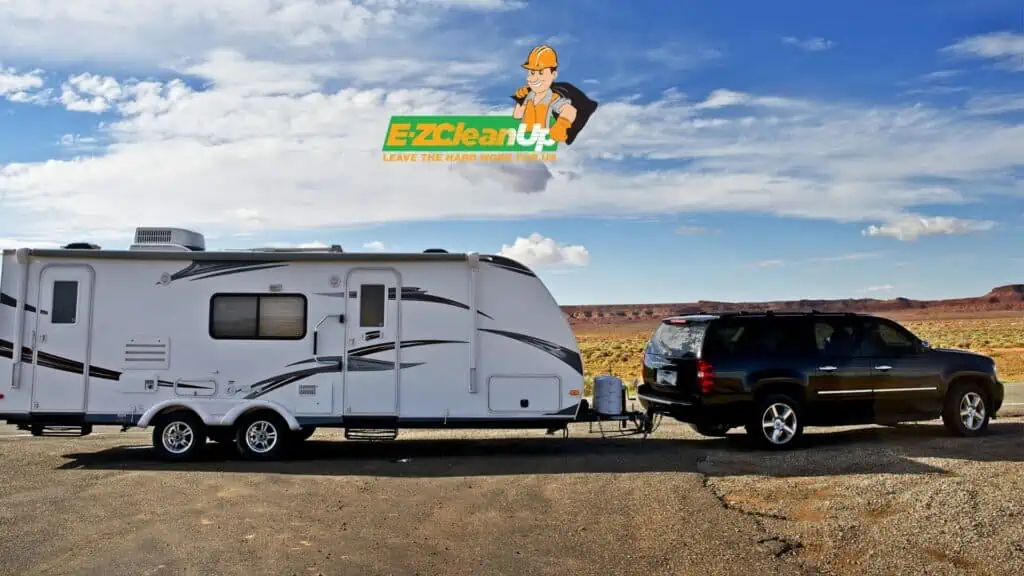
Mobile Home Demolition FAQ
Can Environmental Factors Affect the Choice of Demolition Method for a Mobile Home?
Environmental factors can significantly influence the choice between deconstruction and demolition. In areas where there is a strong emphasis on sustainability and waste reduction, deconstruction may be the preferred method.
This approach aligns with environmental goals by maximizing the amount of material that can be recycled or reused. It minimizes the environmental footprint of the demolition process.
On the other hand, in situations where the environmental regulations are less strict or when the immediate surroundings are less sensitive to the impacts of demolition waste, traditional demolition might be considered more feasible. This is especially helpful when time constraints are critical.
How Can I Ensure That the Mobile Home Demolition Complies With Local Wildlife and Habitat Protection Laws?
Ensuring compliance with local wildlife and habitat protection laws involves conducting a thorough environmental assessment prior to the demolition. This might include hiring environmental consultants to identify any potential impacts on local wildlife and their habitats.
Based on the findings, you may need to implement specific measures to mitigate these impacts. These include scheduling the demolition outside of breeding seasons or establishing barriers to protect nearby habitats.
Always consult with local environmental authorities or wildlife conservation agencies to obtain the necessary permits and guidance on best practices for minimizing ecological disruption.
What Are the Options for Disposing of Hazardous Materials Found in a Mobile Home During Demolition or Deconstruction?
The disposal of hazardous materials found in a mobile home, such as asbestos, lead-based paint, or chemical residues, requires careful handling and adherence to specific regulations. This aims to prevent environmental contamination and health risks.
The first step is to hire qualified professionals to conduct a thorough inspection and identify any hazardous materials. These materials must then be removed and disposed of in accordance with federal, state, and local regulations.
Typically, this involves transporting the hazardous materials to certified disposal facilities that are equipped to handle them safely. It’s crucial to document the disposal process thoroughly. Keep detailed records of the identification, removal, transportation, and disposal of all hazardous materials for regulatory compliance and future reference.
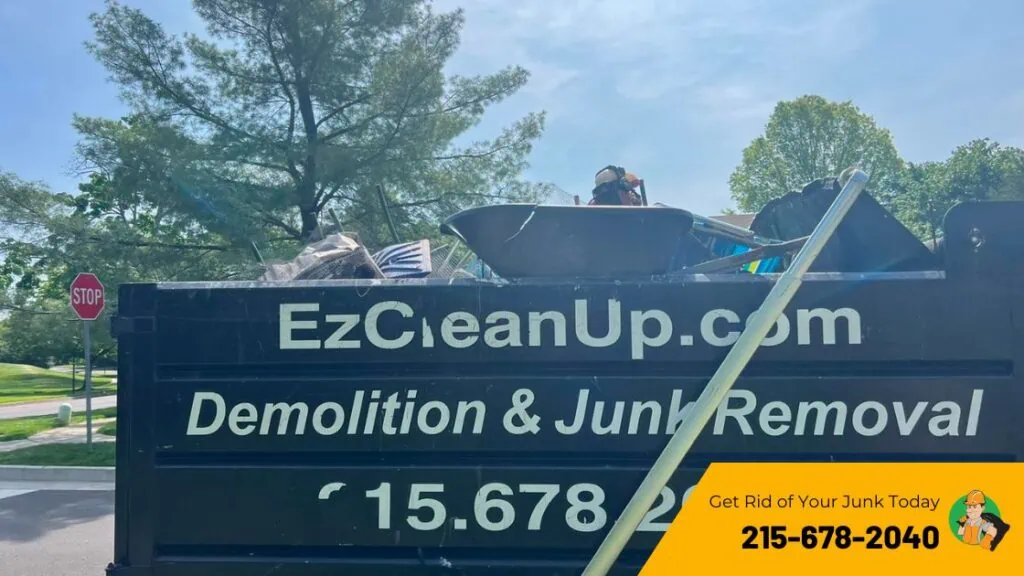
Easy Cleanup After Mobile Home Demolition
After demolishing a mobile home, let EZ CleanUp take care of the mess. We’re not just about hauling away the junk; we offer comprehensive solutions for both residential and commercial sites.
We handle everything from the bulky debris of a mobile home demo to general junk removal with ease. Our services include dumpster rentals tailored for your specific needs, ensuring a hassle-free disposal process.
Ready for a clean slate? Call us, and let’s get down to business.


